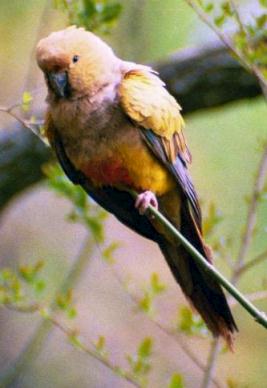 Bleached Burrowing parrotIllegal wildlife traffickers in Argentina are bleaching the plumage of common parrots and passing them off as their rarer and more valuable cousins. Wildlife groups say the burrowing parrot, a breed that inhabits most of the country’s territory, is being captured in large numbers and dyed in order to give it the appearance of a much rarer Amazon species that can fetch at least double the price on the thriving black market.
Bleached Burrowing parrotIllegal wildlife traffickers in Argentina are bleaching the plumage of common parrots and passing them off as their rarer and more valuable cousins. Wildlife groups say the burrowing parrot, a breed that inhabits most of the country’s territory, is being captured in large numbers and dyed in order to give it the appearance of a much rarer Amazon species that can fetch at least double the price on the thriving black market.
The bird, which has an olive green back, blue wings and a yellow belly with a red stain, is given a hydrogen peroxide bath to give it the appearance of a blue-and-yellow macaw, which has a much higher price tag of up to $530. They are then sold at fairs in Buenos Aires and elsewhere as part of an illegal trade in exotic wildlife worth millions of dollars annually.
Liliana De Romano, head of the Familias Protectoras de Silvestres, (Association to Protect Wildlife), said the practice was driven by an “inhuman demand” for rare parrots. In Buenos Aires, fairs operated an unbridled trade in wildlife despite animal protection laws, which she claimed were not adequately enforced. Vendors even sold the bleached parrots openly outside municipal buildings in the city, she added.
Also known as the burrowing parakeet, the bird did not always have to undergo a dye job to attract attention. Charles Darwin wrote about the species in the 1830s after encountering the birds in Patagonia, where they form the largest parrot colony in the world. But to dealers, the Amazon species “are obviously worth much more”, Ms De Romano said.
Duped buyers may find themselves trying to return dead parrots as careless bleaching can destroy their livers, causing them to die within a month. Those that survive will reveal their true colours on molting, around a year after purchase.